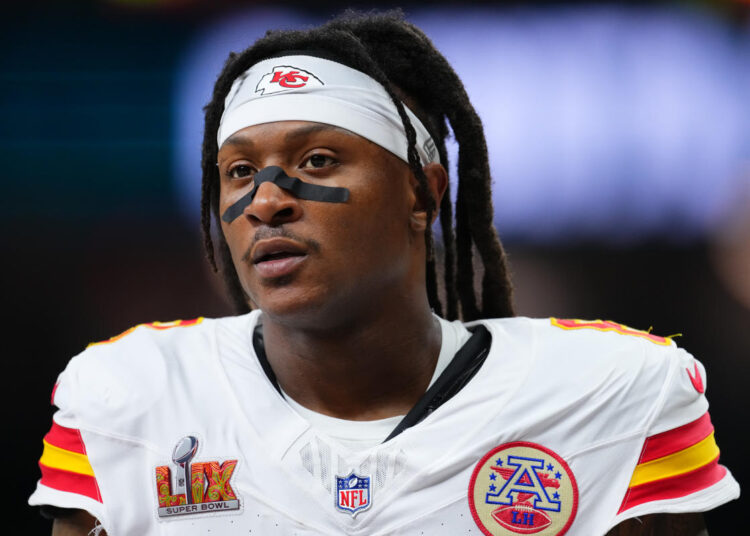One of the biggest stories of the NFL season revolved around how the Kansas City Chiefs were officiated and fan theories that they received preferential treatment from the league.
After a blowout loss to the Philadelphia Eagles in the Super Bowl, Chiefs receiver DeAndre Hopkins asked how the shoe fits on the other foot. Or, more specifically, where’s the outrage over close calls that benefited the Eagles?
Hopkins broached the subject briefly in his postgame media availability while lamenting that there were a lot of “touchy calls” in Philadelphia’s 40-22 win Sunday night.
“It’s my first year being with the Chiefs and I saw a lot of things in the media about the refs, but what are you all going to say now about the refs and us?” Hopkins said. “There was a lot of touchy calls. Are you going to report that? Are you going to talk about the refs now?”
Hopkins didn’t call out any specific plays and didn’t appear to be on the receiving end of any close calls that went against the Chiefs. But there were a pair of personal fouls called against the Chiefs that not everyone agreed on.
Roughing call keeps Eagles TD drive alive
The first took place on Philadelphia’s first touchdown drive midway through the first quarter. On third-and-5, Jalen Hurts targeted tight end Dallas Goedert, but missed him high. Goedert and Chiefs cornerback Trent McDuffie made contact in the air after the ball bounced off Goedert’s hands.
There was grazing contact to Goedert’s helmet, and his head snapped back. McDuffie drew a personal foul for unnecessary roughness.
Instead of a third-and-5 incompletion at the Kansas City 42-yard line, the Eagles were awarded 15 yards and a first down at the 27. The Eagles scored a touchdown two plays later for a 7-0 lead.
Then, late in the second quarter, another personal foul turned a would-be third-and-26 into a first down for the Eagles. This time, Chiefs linebacker Nick Bolton made contact with Saquon Barkley after an incomplete pass.
The contact wasn’t egregious but Bolton didn’t refrain from giving Barkley a shove that knocked him to the turf.
That penalty put the Eagles at first-and-10 at their own 44 with 2:25 left in the half. They didn’t convert the penalty into a touchdown this time. Instead, they punted four plays later with 1:56 remaining before halftime.
Chiefs on receiving end of a high-stakes close call
These, of course, weren’t the only close plays Sunday night. The Chiefs benefited from a borderline offensive pass interference call on Philadelphia’s first possession that forced an Eagles punt on a play that would have otherwise produced a first down in the red zone.
But the biggest difference in the calls that benefited the Eagles Sunday night and the uproar over calls that benefited the Chiefs throughout the season is that it’s difficult to argue that Sunday’s night’s calls impacted the outcome of the game.
The first call in question did keep alive an Eagles touchdown drive. But the Eagles dominated the game en route to a 24-0 halftime lead lead and at no point appeared in danger of losing. Several of the calls that sparked outrage against the NFL throughout the season were in high-leverage, end-game situations in Chiefs wins.
Read the full article here


























Discussion about this post